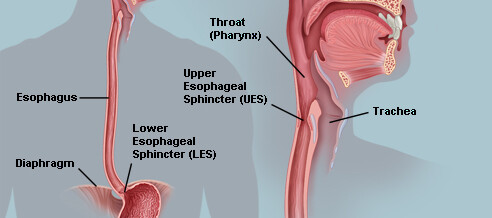
I have just posted an update regarding oesophageal disorder, in particular with regards to heartburn. GORD or gastro-oesophageal reflux disease is a common condition affecting around 20% of the population with symptoms at least once a week. Go to my post to find more information on heartburn. I’ve outlined some of the most common causes of heartburn, and in particular what foods to avoid if you are suffering from troublesome heartburn symptoms.
GORD refers to a condition where the stomach contents enter the lower oesophagus leading to either damage to the oesophagus or to troublesome symptoms. The main problem relates to transient relaxation of the lower oesophageal sphincter. This sphincter acts as a one way valve, and normally prevents to stomach contents from entering the oesophagus (food pipe).
The stomach produces acid which help to digest food as well as providing an immune defense. The cells lining the stomach are designed to handle an acidic environment, whereas the oesophageal cells do not handle the acidic environment well. The acid in the oesophagus typically leads to symptoms of heartburn, and in some cases can also lead to acid injury of the lower oesophagus (erosive oesophagitis).
Spicy foods, citrus and tomato products are common causes of heartburn. Eating large meals, particularly just before going to bed, as well as bending over or stooping, can aggravate heartburn. A hiatus hernia is a common condition where part of the stomach bulges into the chest – this can impair the functioning of the lower oesophageal sphincter which can worsen heartburn. Obesity is also another common contributor to heartburn.
APR
About the Author: